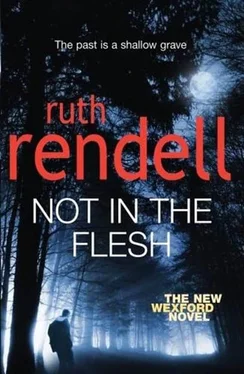“What d'you mean, interfered with?” Grimble asked.
“Had it been touched? Had anything been put in it? Had it been disturbed?”
“How should I know? Bill Runge filled it in. I paid him to do it and he done it. To be honest with you, I was too upset to go near the place. I mean I'd banked on getting that permission, I'd as near as dammit been promised I'd get it. Can you wonder I was fed up to my back teeth? I was ill as a matter of fact. You ask the wife. I was laid up in bed, had to have the doctor, and he said no wonder you're in a bad way, Mr. Grimble, he said, your nerves are shot to pieces and all because of those planning people and I said-”
Wexford almost had to shout to get a word in. “When was permission refused?”
Again it was Kathleen who answered him. “I'll never forget the date, he was in such a state. He started the digging end of May and the second week of June they wrote to him and said he could build one house but not more.”
Out in the little hallway, shaking her head, casting up her eyes, and with a glance at the open door behind them, she whispered, “He's still on the phone to his pal most days. After eleven years! That's all they talk about, those two, that blessed planning permission. It gets you down.”
Wexford smiled noncommittally.
Rather shyly, she peered up into his face. She was a little woman with thinning reddish hair, round wire-rimmed glasses sliding down her nose. “I don't know if I ought to ask, but how did you know there was a dead body in there? It wasn't that truffle man, was it? I thought he'd died.”
Wexford only smiled.
“If John thought that, he'd go mad. He hates that truffle man. He hates trespassers. But if he's dead, that's all right.”
“I've a feeling,” Wexford said when they were back at the police station, “that we've got a mystery person-man or woman, we don't know yet-on our hands. Identification is going to be a problem. I shan't be surprised if we're still asking who this character is in three months' time. It's just a hunch but I do have these hunches and often they're right.”
Burden shrugged. “And just as often they're wrong. His teeth, her teeth, will identify him or her. His or her dentition, I should say. It never, or rather, seldom, fails.”
“I'm not telling the media anything till Carina gets back to me. It's not a good idea, confronting them with a cadaver we can't even say was a man or a woman. We can't say how he or she died or whether foul play, as they always put it, is suspected or not.”
“What is it you always say?” said Burden. “A body illicitly interred is a body unlawfully killed.”
“Pretty well true,” said Wexford, “but not invariably.”
“By the way, the kid with the knife said his mother gave it to him. She's called Leeanne Fincher. She said it made her feel better when he was out of the house knowing he'd got a weapon. I think I'll go see her on my way home.”
Wexford too went home. He walked. Dr. Akande had told him it was time he paid attention to that long-neglected piece of machinery, that once-efficient pump, his heart. Not in the half-hearted (halfhearted!) way he had in the past, dieting in a feeble fashion, forgetting the diet in favor of indulgence in meat and cheese and whiskey, exercising in ever-decreasing spurts, letting Donaldson drive him whenever it rained or the temperature fell below fifteen degrees, running out of statins and not renewing his prescription. Now it was a walk to work and a walk home every day, a double dose of Lipitor, a single glass of red wine every evening, and cultivating a liking for salads. Why did all women love salads and all men hate them? You could almost say that real men don't eat green stuff. He had refused adamantly and rudely to join a gym. Burden went to one, of course, bouncing up and down on cross-trainers and walkways-or was it crossways and walk-trainers?-and pumping metal bars that weighed more than he did.
The walk was downhill in the morning and uphill in the evening. He often wished the reverse was true. He had even tried to find a new way of doing the journey so that, if not downhill, it was flat all the way, surely a possibility if one's route went around the side of a hill. It might be a possibility, but it wasn't discoverable in the terrain of Kingsmarkham. He turned the corner into his own street and approached the house where Mr. and Mrs. Dirir and their son lived. It was called Mogadishu, which Wexford knew he should have found touching, exiles reminding themselves daily of their native land. Only he didn't. He found it irritating, not, he told himself, because it was such a very un-English name for a house, but because it had a name at all. Most, if not all, of the other houses in the street had numbers only. But he wasn't quite sure that this was the real reason. The real reason would be racist, and this bothered him for he sincerely did his best, constantly examining his conscience and his motives, to avoid even a smidgen of race prejudice. If it underlay his feelings about the Dirirs, it could perhaps be attributed to the undoubted bias in the town and no less among the police, against immigrants from Somalia. There was a small colony of them in Kingsmarkham, mostly law-abiding, it seemed, though they seemed as a race to be secretive people, modest, quiet, religious-some Christian, most Moslem-industrious, and reserved. The bias rested on the fact or the suspicion or the unfounded prejudice that their sons went about armed with knives.
When the Dirir's and their son came around for a drink-in their case Dora's latest health fad, pomegranate juice or, as they preferred, fizzy lemonade-they all got on well, even if conversation was a little stilted. They spoke good English, were considerably better educated, he had thought ruefully, than he was, and all of them anxious for the betterment of their community's fortunes. Mrs. Dirir constituted herself a kind of social worker among her fellow immigrants, keeping an eye on their health, their work opportunities, their financial state, and the welfare of their children. Her husband was a civil servant in the local benefit office, her son a student at the University of the South in Myringham.
Wexford had noticed that while he and Dora called everyone else they knew in the neighborhood by their given names, the Somali couple were Mr. and Mrs. Dirir just as they were Mr. and Mrs. Wexford. If Hannah Goldsmith had been aware of this, she would have called it racism of the worst kind, the sort that decrees meting out an extravagant respect to people of a different color from oneself; a respect, she would say, that in the half-baked liberal masks contempt. Wexford was pretty sure he didn't feel contempt for the Dirirs, rather a puzzlement and a failure to find any common ground between them. He thought he might try calling Mr. Dirir Omar next time he met him, and Mrs. Dirir Iman, and as he was wondering how he might achieve this, Mrs. Dirir emerged from her front door for no reason that he could discern but to say, “Good evening, Mr. Wexford.”
There was no time like the present. It still took a bit of nerve to say as he did, “Good evening, Iman. How are you?”
She seemed somewhat taken aback, said in a preoccupied way, “Fine. I am fine, thank you,” and retreated into the house. He worried all the rest of the way home that he had been too precipitate and offended her.
The next day Carina Laxton told him the body found on Grimble's land had once, between ten and twelve years before when it was still alive, been a man. Whoever had killed him had wrapped his body in some kind of purple cloth before burying him. What he had died of she couldn't tell and warned him with a frown that it was possible she might never be able to tell. It was policy now to have two pathologists conduct the autopsy, and Dr. Mavrikian had also been present. Scanning the report, Wexford saw that he also had little faith in ever finding the cause of death. The only clue to that cause was a crack in one of the dead man's ribs.
Читать дальше











